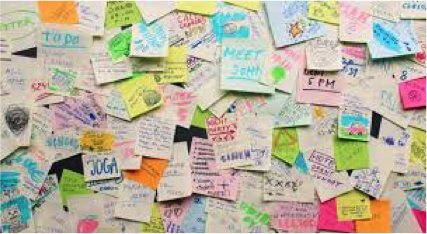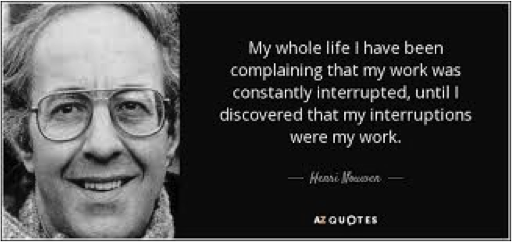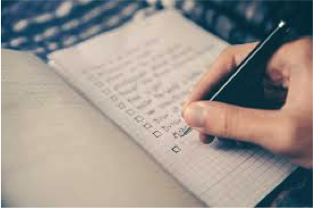A New Year’s Revelation for teachers
by Liz Lord
In the second of our series of blogs looking at the essential qualities of school mindfulness teachers, Liz Lord questions the constant and never ending ‘to do’ lists and offers an alternative…
I worked for almost 20 years as a teacher, SLT member, SENDCO, CAMHS link and lead for mental health and wellbeing, and for most of that time I constantly had a ‘to do’ list on the go. It seemed an infinite stream of tasks with a life of its own, causing endless stress.
Sometimes, I seem to recall, it would include items written in a hurry, such as ‘sort out Kate’ (a pupil!). How on earth do you do that? And yet, that was the nature of working with children and young people, especially in the area of wellbeing. Time and the system wasn’t on my side and I had little control of the influences surrounding the young people I was working with. ‘Banging my head against a brick wall’ often came to mind when dealing with my ‘to do’ list. Or to use another more northern expression – it was like plaiting fog.
 My task list was never ending and it ultimately robbed me of the energy and enthusiasm that those young and impressionable individuals deserved. Does any of this sound familiar?
My task list was never ending and it ultimately robbed me of the energy and enthusiasm that those young and impressionable individuals deserved. Does any of this sound familiar?
I attended a training event at work where staff shared their aspirations and long ‘to do’ lists. My heart sank: more ‘to do’s! As I listened, I realised that not one person mentioned any of the personal qualities that, as we all know, can make such a difference to any situation. It was a moment of clarity for me. Eureka! It shouldn’t be just about a ‘to do’ list but a ‘to be’ list! How do I want to be in the world, in my classroom and how can this shift in emphasis bring a greater sense of fulfilment to my work and life? In many contexts this was the only thing that I had any control of. ‘How can I be in this situation?’
So I decided to try it out. My ‘to be’ list consisted not just of general things such as, be kind or caring or loving, but more specific things like; make time and space for people, allow people the time to express themselves, listen more carefully, show kindness in small ways (with cups of tea, opening doors, smiling!), appreciate conversations, write more ‘thank you’ emails, notice things outside myself, notice things inside myself. This is not the exhaustive list but it gives you a flavour. All of these things were not to be ticked off a list, like obligations completed, but rather they were about spending time cultivating a sense of interest in the people around me and helping me to value and appreciate a deeper sense of community in the classroom and the school.
I wanted to move away from glorifying busyness, rushing and skimming over things to something more wholesome.
 I remember a lovely passage that used to help me when pupils or staff came to my door, especially if I was ‘busy’, had a deadline to hit or a lesson to plan. It was taken from a book I had read by Henri Nouwen, a Jesuit priest and writer. It had always struck a chord with me and left a lasting impression: “My whole life I have been complaining that my work was constantly interrupted, until I discovered that my interruptions were my work”.
I remember a lovely passage that used to help me when pupils or staff came to my door, especially if I was ‘busy’, had a deadline to hit or a lesson to plan. It was taken from a book I had read by Henri Nouwen, a Jesuit priest and writer. It had always struck a chord with me and left a lasting impression: “My whole life I have been complaining that my work was constantly interrupted, until I discovered that my interruptions were my work”.
I love this little saying. Often, when I just stopped and let those interruptions develop into something more meaningful, real connections were made, helping to initiate change and create new perspectives. In a sense, there are no interruptions, simply life unfolding in its own way.
 Am I saying that focussing on my ‘to be’ list reduced my ‘to do’ list? I’m not sure about that but it certainly helped me to experience more ownership of the things I could change. A sense of acceptance and awareness was brought to the smaller interactions which, in turn, had an effect on me and my ability to appreciate things and experience connections more fully. I felt a certain ‘lightness’ which may seem a bit vague but it is the only word I can think of to describe the sense that came from regularly appreciating the small things that were happening in my day. Something definitely shifted as I more consciously cultivated and fostered a greater sense of awareness and appreciation for whatever or whoever crossed my path
Am I saying that focussing on my ‘to be’ list reduced my ‘to do’ list? I’m not sure about that but it certainly helped me to experience more ownership of the things I could change. A sense of acceptance and awareness was brought to the smaller interactions which, in turn, had an effect on me and my ability to appreciate things and experience connections more fully. I felt a certain ‘lightness’ which may seem a bit vague but it is the only word I can think of to describe the sense that came from regularly appreciating the small things that were happening in my day. Something definitely shifted as I more consciously cultivated and fostered a greater sense of awareness and appreciation for whatever or whoever crossed my path
2020 has seen such uncertainty, with so much around us that we cannot control or even predict, and the year ahead will have its own challenges and trials. So over this New Year, if you write a ‘to do’ list for 2021, why not try writing a ‘to be’ list as well and see what happens?
Read the first article in this series: The Lost Qualities of Teachers – Finding a Way Back with Mindfulness | Mindfulness in Schools Project
Read all of our Top Tips about teaching mindfulness in schools in The Hub.
Sign up to our newsletter to receive regular updates about our work and about mindfulness in school.